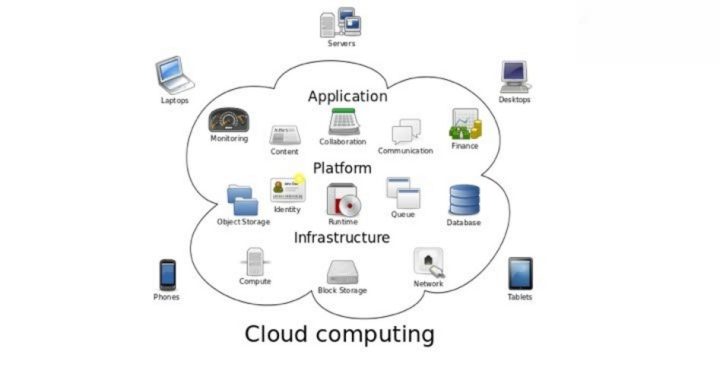
Nearly all the data collected by the National Security Agency (NSA) is being transferred to the cloud. The database — Intelligence Community GovCloud — is reportedly classified and will help the federal surveillance organization to “connect the dots” among the scores of systems currently employed by the agency to store and sort data.
“Right now, almost all NSA’s mission is being done in [GovCloud], and the productivity gains and the speed at which our analysts are able to put together insights and work higher-level problems has been really amazing,” NSA Chief Information Officer Greg Smithberger told NextGov.
Smithberger explained GovCloud as a single integrated “big data-fusion environment,” technology that would allow the NSA and the myriad federal agencies participating in the surveillance of electronic communications to share data seamlessly and much more efficiently than before. The Central Intelligence Agency and National Geospatial-Intelligence Agency are two of the 16 agencies that will be given access to the cloud and the personal data stored there.
This is the motivation for the move to the cloud. Not only can the NSA more easily share data with its sister agencies in the United States, but surveillance apparatuses overseas can take advantage of the off-site electronic warehouse, too. Foreign intelligence agencies can not only upload their data to GovCloud, but they can access the data saved by the American snoops, as well.
As the NexGov story explained, surveillance groups worldwide can combine their data with that of the NSA “into a single data lake analysts from the NSA and other IC agencies can run queries against.”
Simply put: This cloud — which we are promised is classified — will not only be the digital repository of the electronic data collected by our own government’s unconstitutional efforts to wiretap the world, but it will be the home of all that is heard by the global listeners, as well.
Apart from access, the NSA will benefit from the increased speed with which all that information can be seized, searched, sorted, and sent to the appropriate nation’s intelligence agency.
“This environment allows us to run analytic tools and do machine-assisted data fusion and big data analytics, and apply a lot of automation to facilitate and accelerate what humans would like to do, and get the machines to do it for them,” Smithberger told NexGov. Analysts can “interactively ask questions” of the cloud’s operating system and it will then produce the requested data in “humanly readable form.”
The system backing the GovCloud database is, NexGov reports, the same as is found “in data centers owned by Facebook, Amazon or other industry titans.”
That’s comforting.
Nothing could go wrong with thousands of technicians at Facebook and Amazon having years of experience with the platform being used by the NSA to store all the electronic data it collects in its global dragnet.
Regarding this less-than-reassuring public-private partnership, NexGov reports: “IC GovCloud is one of two major cloud initiatives across the IC. Four years ago, the CIA awarded a $600 million contract to Amazon Web Services to develop a commercial cloud environment for the IC agencies. Today, the Amazon-developed C2S provides utility computing services to the IC.”
Smithberger assures us there’s nothing to worry about, however. “It’s really a hybrid of the latest and greatest commercial technology,” Smithberger told NextGov, “but a lot of custom NSA technology and a lot of unique development we’ve done to actually create these outcomes.”
Not that the NSA doesn’t appreciate the potential for hacking that exists in any cloud-based database.
In a handbook published in 2009, the NSA admitted there was really no way to wall off the cloud — any cloud — from people determined to find a way to get to the data, particularly when everybody knows just how large the database is and how valuable the data stored there would be. In a section called “Vulnerability to Attacks,” the guide explains:
If a cloud is providing compute and storage services over the Internet such as the Amazon approach, security and reliability capabilities must be extended to deal with malicious attempts to access other users’ files and/or to deny service to legitimate users. Being able to prevent, detect, and recover from such attacks will become increasingly important as more people and organizations use cloud computing for critical applications.
In a statement published by Network World, former NSA Director General Keith Alexander pointed out the protocols in place to protect the GovCloud from hacking:
We do utilize a variety of security protocols at every layer of the architecture, as well as a robust encryption strategy. The NSA cloud brings together multiple data sets and protects each piece of data through security and enforcement of the authorities that specify its use…. In addition to data markings, security is applied throughout the architecture at multiple layers to protect data, systems, and usage.
Regardless of the rapid advancement of technology and the acceleration of the analysis of all the data gobbled up by the NSA, the Constitution is still the law and the principles of liberty upon which it is founded are timeless.
The Fourth Amendment to the Constitution mandates:
“The right of the people to be secure in their persons, houses, papers, and effects, against unreasonable searches and seizures, shall not be violated, and no warrants shall issue, but upon probable cause, supported by oath or affirmation, and particularly describing the place to be searched, and the persons or things to be seized.”
For nearly two decades our elected representatives (and the courts, for that matter) have disregarded the Constitution and built a domestic spy apparatus that bears no resemblance whatsoever to the blueprint provided by our Founding Fathers in the Constitution.
Image: Sam Johnston via Wikimedia



